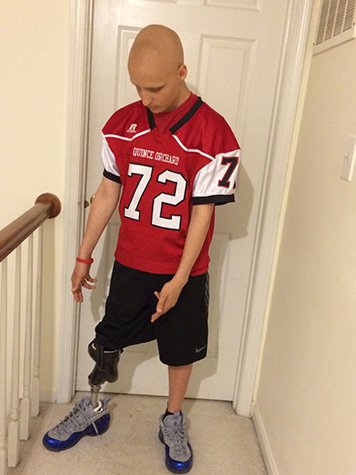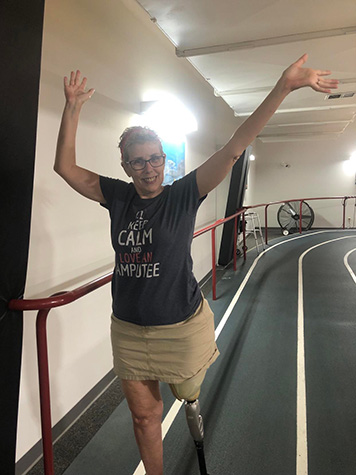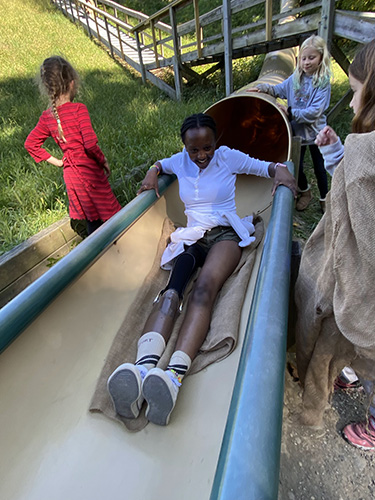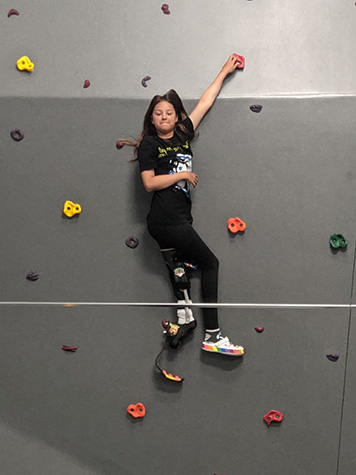This section is about communication with your surgeon and starts with PACE: How to Talk to Your Surgeon. PACE is a communication strategy that can help you prepare for discussions with your surgeon. Second Opinions is about seeking advice from different surgeons, followed by 20 Questions for Your Surgeon with a PDF option.
PACE: How to Talk to Your Surgeon
A bone cancer diagnosis is traumatic for families. Not surprisingly, it is difficult to process complex medical information when we are feeling emotional. I remember not hearing anything else in my first meeting with the orthopedic oncologist (bone cancer surgeon) after he said, “Your daughter has osteosarcoma.”
I think many families are in shock and it grossly impedes the decision-making process, many times negatively. It would be helpful in getting them to understand that they should be actively listening to options and making decisions vs letting the physicians tell them what to do.

PACE is a proven strategy to help patients talk to their doctors. PACE helps patients share information such as who they are, what they need to know, what they understand about the surgery, and what their concerns are.
Each of the letters in the word PACE stands for an action you can do:
- Present information
- Ask questions
- Check your understanding
- Express concerns
P
Present Information
Present information about all your symptoms, but also include information about what you like to do or want to do in the future. If your life revolves around sports, a limb salvage may not be the best option for athletics. If you are concerned about body image and physical appearance, you might not be happy with a rotationplasty.
If you present this information, your surgeon will have a better understanding of who you are and what is important to you as you make the decision together.

I think what’s so important is a conversation and saying what the person believes in and what are their interests. I think so many times decisions were made without looking at me as a person, like who I was. For me, for instance, I was such an athlete and such an avid person who loved to work out. Having limb salvage took that identity away from me.

A
Ask Questions
Ask questions about how the location and size of the tumor might affect recovery later. Ask about potential issues that might happen and how they would be resolved. Show that you are interested and understand that there are some things we can’t know. The more you ask, the more you will learn.
- Keep a notebook that you can write questions down ahead of time.
- Take someone else with you to take notes or be another listening ear.
- Ask if you can record the conversation so you don’t forget anything.
I feel strongly that patients should be encouraged to bring in a friend or family member to take notes so they have someone who was there and yet less involved/vulnerable that can hear the information being presented and be a resource after the appointment.
C
Check Your Understanding
Check your understanding of what the surgical results will be and what you can expect over time. You are learning a lot of new medical terms, and it can be overwhelming at times. You can start by saying, “So what I hear you saying is…” and, in your own words, repeat your understanding of what the doctor just said. This shows that you’re interested in applying what you’re learning in a way that makes sense to you.
Show what you know. Doctors share more with patients when they see that they are knowledgeable about their condition and want to be involved.

I just knew from the start that the more I knew, the more they would share with me and the more they would consider me part of the team. That’s what I wanted. It worked.
E
Express Concerns
Express any concerns that you have about the options or about making the decision. Many people say they would not even know what to ask when meeting with their surgeon for the first time.
The time that you have with the surgeon is limited by how much time you will have before the surgery must take place. Some families report that they only meet with their surgeon one time, while others say they have two or more meetings.
I do not want to have to have surgery after surgery after surgery. I don’t want to run the risk of having all of these infections. I want the highest possible margins.
If you have concerns or fears, address them directly and early with the surgeon to get timely answers. This may help lessen any surprises down the road. If you are worried about phantom limb pain or foot drop, express those concerns. This lets your surgeon know that more information needs to be shared on their end.
If you are the parent of a child with bone cancer, consider sharing the PACE strategy with them.
We do not know what we do not know when it comes to talking to the surgeon. But no one knows you or your child better than YOU, and it helps your surgeon to understand what matters most in your life. This can be anything from the activities you do now or what you want in the future, to how you feel about your appearance.
Second Opinions

If you are wondering why your surgeon did not mention other surgical options, ask them as soon as possible. You might feel your surgeon prefers one surgery over another one for reasons that do not support what matters most to you.
Surgeons are trained to save the leg if possible, and an amputation can be thought of as a failure. Some surgeons do not like the appearance of a rotationplasty, even though it is a reliable option that allows for high-impact activities, like running and jumping. There are many reasons why a surgeon might be biased for limb salvage surgery.
We had asked about amputation and the doctors were all like, ‘No, no, no. You don’t want to do that.’ So, yeah, we were very overwhelmed and just kind of, ‘Okay. Well, I guess you probably know what’s best.
Orthopedic oncologists are used to patients asking for second opinions and may even expect them. People who have made the decision stress the importance of seeking second opinions for many reasons. Some want to know if there are other options available, while others feel it would help to confirm the option they were thinking would be best for them. Sometimes people just don’t like their first surgeon.
Many surgeons offer virtual visits so you can do them from home. If you do not know where to look, join one of the Facebook groups listed in the Social Support at the end of Know Your Options. Ask expert patients - some groups have lists of surgeons recommended by the patient community.


The initial surgeon described a range of surgical options and risks, sharing examples. We then consulted with another surgeon, who presented one approach (limb salvage surgery with donor bone for bone replacement). We also then consulted with a prosthesis sales representative in another territory not connected to either of the surgeons, regarding the info received and reputations of the surgeons (the rep had no direct experience with the surgeons but asked a third surgeon they worked with). That information helped confirm what our feelings were in the decision process.
Do not wait for the surgeon to ask what kind of life you or your child want.
Advocate for them and for yourself.
20 Questions for Your Surgeon
Some patients report that they only have one or two meetings with their surgeon before a decision is made, so be prepared with questions. If an option is not mentioned, ask why as early as possible. It may be due to the location or size of the tumor, or the child’s age. For example, the family of a young child may prefer RP or AMP due to the many surgeries over time that would come with LSS.
Surgery
| 1 | What are my options? |
| 2 | Do any of the options affect the risk for recurrence, relapse, or survival? |
| 3 | What will I be able to do with each of the options? |
| 4 | What will my limitations be for activity, like running, jumping, etc.? |
| 5 | What additional surgeries can I expect over time with each of the options? |
| 6 | What are the common complications you have seen with this surgery? |
| 7 | How would those complications be resolved? |
| 8 | What are some of the unexpected complications you have seen with this surgery? |
| 9 | How would those unexpected complications be resolved? |
| 10 | What is your experience with patients who have one type of surgery, then later choose another? |
| 11 | What is the pain experience like for people with this surgery over their lifetime? |
| 12 | What can be done during surgery to avoid pain later? Ask about targeted muscle reinnervation (TMR) and other surgical options. |
Connections and Support
| 1 | Who are local prosthetists I can talk with about prosthetics? Ask if the prosthetist can meet with the surgeon prior to surgery to discuss shaping the limb for a more comfortable fit with your prosthesis. |
| 2 | Who are the local physical therapists you use, and how can I talk with them? |
| 3 | Are there other patients of yours that I can meet or talk to about their decision? |
| 4 | How do I connect with amputee groups to meet amputees and ask questions? |
| 5 | How can I best communicate with you and ask more questions? |
| 6 | Who can I speak with if you are unavailable? |
| 7 | Who can I talk to about my insurance coverage for prosthetics? |
| 8 | Where can I go for additional information about the options? |
Be sure to use the PACE strategy when meeting with your surgeon:
Present information, Ask questions, Check your understanding, and Express concerns.

